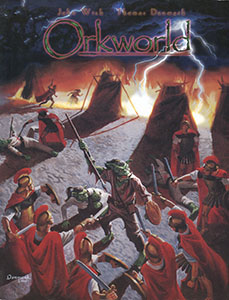This review originally appeared in the December 2000 issue of Games Unplugged.
 In 1997 Legend of the Five Rings, designed by John Wick, won the prestigious Origin Award for Best Roleplaying Game of the Year.
In 1997 Legend of the Five Rings, designed by John Wick, won the prestigious Origin Award for Best Roleplaying Game of the Year.
In 1999 7th Sea, designed by John Wick, won the prestigious Origin Award for Best Roleplaying Game of the Year.
In 2000 Orkworld, designed by John Wick, was released at GenCon.
And I’ll be damned if it doesn’t make a really strong case for giving the award to John Wick one more time.
The system itself is nothing which is going to send shockwaves to the foundations of gaming: A simple dice pool system lies at the heart of it, and is spun off with some interesting, and at times highly effective, extrapolations for combat. The resolution mechanic itself is a nice refinement of its predecessors, providing a smooth modeling of skill and ability. The combat system, for its part, maintains a simple flow while keeping in touch with the game’s inherent pace and spirit.
In other words, its well done – but nothing to get excited about. Orkworld’s game system, however, serves merely as the foundation for the material which really makes the game shine: The orks themselves.
Wick refers to his book as an “anthropological study of a race that never existed”. The concept of an “anthropological game” – a game which focuses on the intricacies of an alien culture, revealing its hidden complexities of daily life so that a common roleplayer will become equipped with the tools necessary to step into the shoes of someone truly from another world – is a lofty goal, worthy of commendation merely for the attempt. It’s one thing to say “look at these characters who are not like human beings at all”. It is quite another to show us to how to play one.
Does Wick succeed? Most definitely. In over 250 pages of setting information, the orkish culture is detailed down to the finest points – from religion to food to sex to love to politics to war to mythology to philosophy to magic… It’s all here in sumptuous detail. And Wick’s great talent offers an assurance that every page is kept interesting and entertaining. Instead of bogging you down as you might expect, the wealth of minute detail is carefully chosen and presented so that it is a liberation, not a limitation.
Orkworld is not flawless by any means: There are a number of unfortunate lay-out and typographical errors throughout the book. A couple of the combat rules have minor holes. Although the orks themselves are laid out in wondrous detail, the rest of the World of Ghurtha suffers from a certain scantness of detail.
But putting the nitpicks aside, there is little doubt that you will find your $25 richly rewarded when you finish this book. Indeed, the reading experience itself is worth the cost of admission – and you won’t have even begun to see the dividends which the book will provide to your gaming experience.
Grade: A
Writers: John Wick
Publisher: Wicked Press
Price: $25.00
Page Count: 304
Product Code: WP10001
After the initial appearance of a review, Games Unplugged would run a short recap of the review in subsequent issues.
Recap/Tagline: In 1997, John Wick’s Legend of the Five Rings won the Origin Award for Best Roleplaying Game of the Year. In 1999, John Wick’s 7th Sea won the Origin Award for Best Roleplaying Game of the Year. And with the release of Orkworld at GenCon this year, John Wick has made a strong case for winning the prestigious reward yet a third time.
Orkworld is an “anthropological game” – a game which focuses on the intricacies of an alien culture, revealing its hidden complexities of daily life so that a common roleplayer can truly step into the shoes of someone form another world. This lofty goal is accomplished through a wealth of entertaining detail – ranging from religion to food to sex to love to politics to war to mythology to philosophy to magic and more. All of this is supported by a solid dice pool system, which puts the finishing cap on an inescapable conclusion: You should buy this game.












I don’t understand the D grade. The review seems overall very positive, why the low score?
Wait, all that praise and you gave it a D grade?
You wrote a glowing review of the product, referring to its negatives as “nitpicks”, but at the end you gave it a grade of “D”. Is that a typo? If not, I’m very confused.
Why the grade of ‘D’ — or is that a typo?
Would you believe it was a D for DERRIFIC!
… no?
Typo fixed.